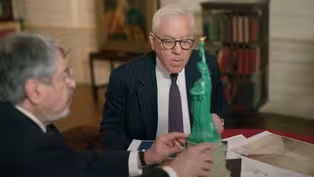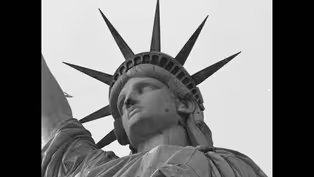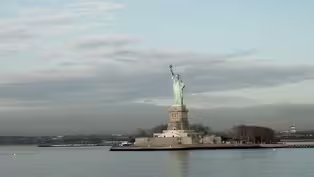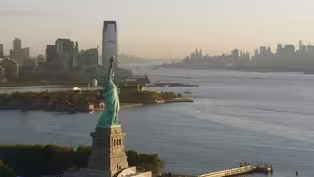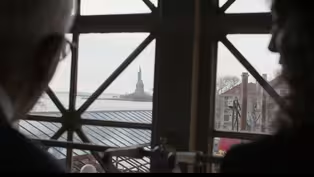
A Catalyst for Reflection on Our Past Transgressions
Clip: Episode 5 | 1m 6sVideo has Closed Captions
Poet Laureate Tracy K. Smith reflects on Lady Liberty's potential as an agent of change.
"A monument isn't a policy, but it's an object for which our vocabulary, and our feelings, our hopes and even our anxieties can be projected." United States Poet Laureate Tracy K. Smith reflects on the Statue of Liberty's potential as an agent of change. Smith wrote “Harbor” to celebrate the 2019 opening of the Statue of Liberty Museum on Liberty Island in New York City.
Problems playing video? | Closed Captioning Feedback
Problems playing video? | Closed Captioning Feedback
Iconic America: Our Symbols and Stories with David Rubenstein is a production of Show of Force, DMR Productions, and WETA Washington, D.C. David M. Rubenstein is the host and executive...

A Catalyst for Reflection on Our Past Transgressions
Clip: Episode 5 | 1m 6sVideo has Closed Captions
"A monument isn't a policy, but it's an object for which our vocabulary, and our feelings, our hopes and even our anxieties can be projected." United States Poet Laureate Tracy K. Smith reflects on the Statue of Liberty's potential as an agent of change. Smith wrote “Harbor” to celebrate the 2019 opening of the Statue of Liberty Museum on Liberty Island in New York City.
Problems playing video? | Closed Captioning Feedback
How to Watch Iconic America
Iconic America is available to stream on pbs.org and the free PBS App, available on iPhone, Apple TV, Android TV, Android smartphones, Amazon Fire TV, Amazon Fire Tablet, Roku, Samsung Smart TV, and Vizio.
Buy Now
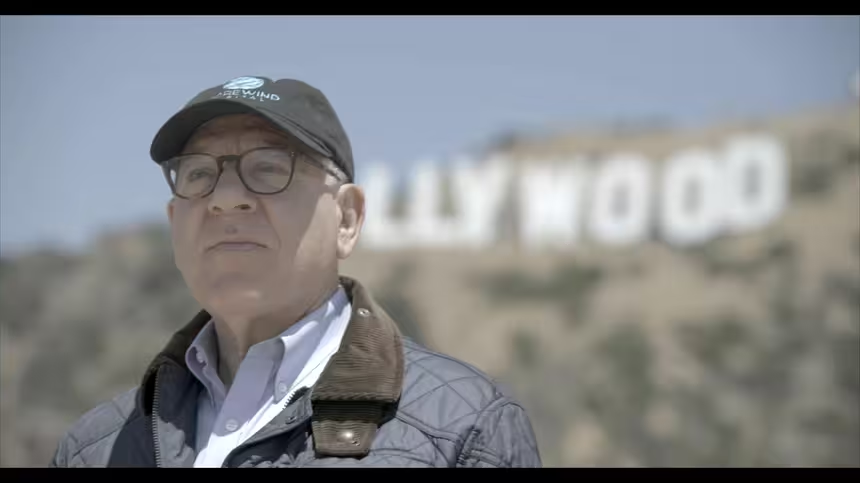
Our Symbols and Stories
David Rubenstein examines the history of America through some of its most iconic symbols, objects and places, in conversation with historical thinkers, community members and other experts. Together, they dive deep into each symbol’s history, using them as a gateway to understanding America’s past and present.Providing Support for PBS.org
Learn Moreabout PBS online sponsorship- A monument isn't a policy, but it's an object toward which our vocabulary and our feelings, our hopes and even our anxieties can be projected.
And so maybe it's a site where some of the difficult reflection and admission could begin to happen, but it's hard to get into conversations about the reality of American history without being questioned about being anti-American, about you know, being somebody who wants to undo all of the good that so many people did.
I think everything has the opportunity to evolve.
Maybe the Statue of Liberty can be not only an impetus to dialogue and conversation, but I imagine that talking through these things in good faith could be incredibly productive and even a little bit healing.
(light ambient music)
Video has Closed Captions
Clip: Ep5 | 3m 56s | America's greatest symbol has its roots in a small town in France, 300 miles from Paris. (3m 56s)
How the Statue of Liberty's Anti-Slavery Origins Evolved
Video has Closed Captions
Clip: Ep5 | 3m 41s | A look at how Lady Liberty's anti-slavery origins and design changed over time. (3m 41s)
A Poem for All Americans, About Immigration
Video has Closed Captions
Clip: Ep5 | 55s | A look at how the poem, "The New Colossus" came to be engraved on the Statue of Liberty. (55s)
Video has Closed Captions
Preview: Ep5 | 31s | It's hard to argue that there's a more iconic symbol of America than the Statue of Liberty (31s)
Video has Closed Captions
Clip: Ep5 | 47s | David Rubenstein asks Professor Ed Berenson why Lady Liberty is a symbol of America. (47s)
"Their Immigration Story Becomes the Story of Their Life"
Video has Closed Captions
Clip: Ep5 | 2m 45s | David Rubenstein visits Ellis Island with Atlantic writer Caitlin Dickerson. (2m 45s)
Providing Support for PBS.org
Learn Moreabout PBS online sponsorshipSupport for PBS provided by:
Iconic America: Our Symbols and Stories with David Rubenstein is a production of Show of Force, DMR Productions, and WETA Washington, D.C. David M. Rubenstein is the host and executive...

